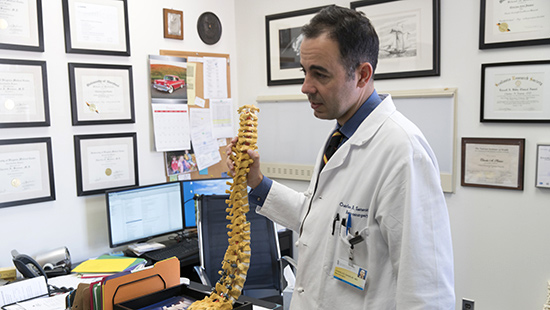Neurosurgical Spine Care

The University of Maryland Spine and Peripheral Nerve Program provides comprehensive care for conditions related to nerves in the spine and throughout the rest of the body.
To provide patients with the most comprehensive care, our neurosurgeons design treatment plans together with other specialists like orthopedic surgeons, pain-management doctors, radiation oncologists and neurosurgical nurses. Team members get to know each patient, factoring in everything from home and family life to work life.
We'll use the latest advances in nonsurgical and surgical treatments to get you back on your feet in as little time as possible.
Conditions We Treat
- Spinal stenosis and degenerative disc disease
- Herniated discs
- Spinal deformities, such as scoliosis
- Injuries of the spine
- Tumors of the spine
A Wide Range of Treatment Options
Our neurosurgeons work with your doctors to manage conditions medically whenever possible. If medical management is no longer effective, they can resolve spinal and nerve conditions using the latest technology and minimally invasive techniques, whenever feasible. These might include lateral lumbar interbody fusion (XLIF), cervical disc replacements and percutaneous fixation.
Our neurosurgeons, experienced in both neurosurgery and orthopedics, are experts in spinal and pelvic reconstruction surgeries that are to treat spinal deformities, such as scoliosis, or to correct previous surgical treatments.
If you have a complex spinal tumor, we also work with the Maryland Proton Treatment Center, which offers a precise form of radiation therapy that increases the radiation dose to a tumor while decreasing the effects on the surrounding tissue.
Dedicated Rehabilitation Unit
Our partnership with UM Rehabilitation & Orthopaedic Institute's Spinal Cord Injury Program, which specializes in treating patients after spinal surgery, means our patients receive comprehensive treatment before, during and after a procedure. The multidisciplinary team utilizes individualized treatment plans based on each patient's needs. The unit offers the Lokomat Machine, a revolutionary technological robotic device that may be able to help paralyzed patients to use their legs again in a robot-steered treadmill.
Access to Clinical Trials
At University of Maryland, our spine and peripheral nerve program experts participate in groundbreaking research, including clinical trials to examine new and existing medications and their impact on spinal cord injuries. Other trials have studied neural stem cells engineered to promote healing of spinal injuries.
